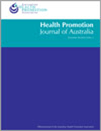Ethnic community group leaders' views on passive smoking in their community
Abstract
Issue addressed
Victoria is one of Australia's most culturally and linguistically diverse States, with a significant proportion of the community speaking a language other than English at home. This study explored the attitudes of a range of leaders of ethnic communities regarding passive smoking in their community in 2001 following the implementation of smoke-free dining in Victorian restaurants and cafes.
Methods
Telephone interviews were conducted with 26 multicultural leaders from 13 language groups.
Results
The multicultural leaders believed that their communities understood passive smoking was harmful to others and were taking measures to protect their children. Half of the leaders said that smoking at social events was no longer acceptable. Restricting smoking inside the home and discouraging visitors from smoking was also thought to be common. However, cultural leaders held the view that some cultural groups still made exceptions with older relatives. Offering cigarettes to smokers as gifts may also be changing. Most of the community leaders surveyed thought that their communities had made a similar shift to that of the mainstream Australian community but at a slower rate, with the smoke-free dining legislation helping to increase their awareness.
Conclusions
The smoking and passive smoking messages seem to be filtering through to multicultural communities, although at a much slower rate than the mainstream community.




